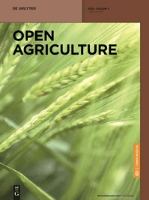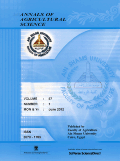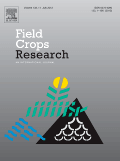
JOURNAL OF THE FACULTY OF AGRICULTURE KYUSHU UNIVERSITY
Scope & Guideline
Enhancing Practices through Original Research
Introduction
Aims and Scopes
- Sustainable Agricultural Practices:
Research on practices that enhance agricultural sustainability, including eco-friendly fertilizers, integrated pest management, and crop rotation strategies. - Food Safety and Quality:
Studies addressing food standards, consumer preferences, and the impact of agricultural practices on food quality and safety. - Agro-Economic Development:
Analysis of economic factors influencing agriculture, including investment decision-making, market participation, and the role of agricultural corporations in rural development. - Biodiversity and Ecosystem Services:
Research on the conservation of biodiversity in agricultural systems, the role of ecosystems in supporting agriculture, and the effects of agricultural practices on ecosystem health. - Innovations in Agricultural Technology:
Exploration of technological advancements in agriculture, including smart farming, genetic improvements, and the use of bioengineering to enhance crop resilience. - Climate Change and Environmental Impact:
Investigations into the effects of climate change on agricultural productivity, carbon emissions reduction, and adaptation strategies for sustainable farming.
Trending and Emerging
- Consumer Behavior and Food Security:
Recent studies have increasingly focused on consumer responsiveness to food safety, environmental sustainability, and the impact of trust in food systems, reflecting growing consumer awareness and demand for transparency. - Climate Resilience and Adaptation Strategies:
There is a rising trend in research addressing climate change impacts on agriculture and the development of adaptive strategies, showcasing the urgency of resilience-building in agricultural practices. - Technological Innovations in Agriculture:
A significant increase in research on smart farming technologies, including precision agriculture, digital tools for farmers, and biotechnological innovations, indicates a shift towards integrating technology with traditional agricultural practices. - Ecosystem Services and Biodiversity Conservation:
Emerging studies emphasize the role of ecosystem services in agriculture and biodiversity conservation, indicating a holistic approach to farming that values ecological health alongside productivity. - Policy and Institutional Trust in Agriculture:
Research on the impacts of agricultural policies, institutional trust, and community engagement in sustainable practices has gained prominence, highlighting the importance of governance in agricultural development.
Declining or Waning
- Traditional Crop Breeding Techniques:
Research focusing on conventional breeding methods has decreased, possibly due to the rise of biotechnology and genetic engineering approaches. - Invasive Species Management:
Studies on invasive species in agriculture have become less frequent, indicating a potential shift towards more integrated pest management strategies that encompass ecological approaches. - Soil Fertility Studies:
While still important, the specific focus on traditional soil fertility assessments appears to be waning as more attention is directed towards holistic approaches to soil health and ecosystem services. - Livestock Production Systems:
There is a noticeable reduction in publications specifically addressing traditional livestock farming systems, likely due to increased focus on sustainable and innovative livestock management practices.
Similar Journals

China Agricultural Economic Review
Fostering Global Perspectives on Agricultural ChallengesChina Agricultural Economic Review, published by EMERALD GROUP PUBLISHING LTD, is a premier journal that holds a significant position in the fields of agricultural economics and biological sciences. With its ISSN 1756-137X and E-ISSN 1756-1388, this journal has dedicated itself to advancing academic discourse since its inception in 2008 and continues through 2024. It boasts an impressive Q1 ranking in both Agricultural and Biological Sciences and in Economics and Econometrics, reflecting its high-quality research contributions, as evidenced by its standing in the top percentiles of Scopus rankings (97th and 92nd, respectively). Aimed at fostering scholarly exchange among researchers, professionals, and students, the journal invites original research articles, reviews, and case studies that explore vital issues and developments impacting agricultural economies, with a keen focus on both theoretical and practical advancements. As a well-regarded platform within the United Kingdom, the journal promotes accessibility and encourages significant contributions to enhance the understanding of agricultural economic dynamics worldwide.

Open Agriculture
Cultivating Knowledge for a Sustainable FutureOpen Agriculture, published by DE GRUYTER POLAND SP Z O O, is an innovative open-access journal dedicated to advancing research in the Agricultural and Biological Sciences. Since its inception in 2016, this journal has been committed to disseminating knowledge and facilitating collaboration among researchers, professionals, and enthusiasts in the agricultural sector. With an impressive Q2 ranking in the Agricultural and Biological Sciences category, it holds a prestigious position, ranking #65 out of 221 in its field, placing it in the 70th percentile. Open Agriculture offers a platform for high-quality research across a diverse range of topics, ensuring that crucial findings are readily accessible to the global scientific community. The journal continues to uphold its mission of promoting sustainable agricultural practices and innovations that address contemporary challenges in food security and environmental sustainability. With its strong commitment to open access principles, researchers and students alike can easily engage with cutting-edge research and contribute to the vibrant discourse surrounding modern agriculture.

ANNALS OF AGRICULTURAL SCIENCES
Transforming Agricultural Science into Practical SolutionsANNALS OF AGRICULTURAL SCIENCES, published by Elsevier, stands as a leading open access journal dedicated to the multifaceted field of agricultural sciences. Since its inception in 2011, this journal has served as a pivotal platform for the dissemination of high-quality research, covering areas such as agronomy, animal science, horticulture, food science, plant science, and soil science. With an impressive Q1 ranking across multiple disciplines and notable positions in Scopus Ranks—including #6 in Animal Science and Zoology and #3 in Horticulture—this journal is recognized globally for its significant contribution to advancing agricultural innovations. The journal caters to a diverse audience of researchers, professionals, and students, providing them with open access to cutting-edge studies that address critical issues in agricultural productivity and sustainability. Its commitment to high-impact research ensures that articles contribute meaningfully to the scientific community, fostering advancements in agricultural practices and policies.

AIMS Agriculture and Food
Empowering research for a resilient food system.AIMS Agriculture and Food is a leading open access journal published by the American Institute of Mathematical Sciences (AIMS), focused on the critical intersections of agricultural and food sciences. Since its inception in 2016, this journal has provided a vital platform for disseminating innovative research and advancements in the fields of agricultural and biological sciences and food science. With impressive Scopus rankings, including a Q2 categorization in 2023 for both Agricultural and Biological Sciences (miscellaneous) and Food Science, AIMS Agriculture and Food is recognized for its significant contributions to the academic community. The journal aims to foster interdisciplinary dialogue by welcoming submissions that tackle contemporary challenges, promote sustainable practices, and enhance food security. Researchers, professionals, and students will find this journal an invaluable resource, offering open access to high-quality, peer-reviewed articles that are essential for informed decision-making in agriculture and food industries.

FIELD CROPS RESEARCH
Shaping the Future of Field Crops Through KnowledgeFIELD CROPS RESEARCH is a premier academic journal published by Elsevier, dedicated to advancing knowledge in the fields of Agronomy and Crop Science as well as Soil Science. Now in its 46th year of publication, this esteemed journal has established itself as a leading resource, holding a prestigious Q1 ranking in both the Agronomy and Soil Science categories, with a remarkable blend of rigorous peer-reviewed research and innovative findings. With a Scopus ranking of #27/406 in Agronomy and #20/159 in Soil Science, and a notable 93rd and 87th percentile respectively, FIELD CROPS RESEARCH plays a vital role in informing practices that drive sustainable agriculture and optimize crop production. Although not an open access journal, it remains highly accessible to the global research community and offers critical insights that influence policy and agricultural practices worldwide. Researchers, professionals, and students are encouraged to delve into this journal, as it continues to shape the future of field crop research through impactful studies and comprehensive reviews.

Temas Agrarios
Exploring Solutions for Food Security and Rural DevelopmentTemas Agrarios is a premier scholarly journal focused on the dynamic field of agricultural sciences, published by the University of Córdoba, Faculty of Agricultural Sciences. Since its establishment, this journal has committed to advancing knowledge and fostering research in agricultural practices and policies, contributing significantly to the discourse surrounding food security, sustainable farming, and rural development. With an open access model implemented in 2003, Temas Agrarios ensures that critical information and research findings are readily available to the global academic community, promoting wider dissemination and accessibility. Researchers, professionals, and students can benefit from its insightful articles, which address pressing agricultural issues in Colombia and beyond, enhancing both local and international scientific dialogue. Although specific impact metrics such as H-index and Scopus rankings are not disclosed, the journal's longstanding presence underscores its importance as a platform for high-quality agricultural research.

PAKISTAN JOURNAL OF AGRICULTURAL SCIENCES
Fostering Sustainable Solutions in Agricultural SciencesWelcome to the Pakistan Journal of Agricultural Sciences, a prominent platform for disseminating vital research findings in the fields of agronomy, crop science, food science, plant science, and soil science. Published by the prestigious University of Agriculture in Faisalabad, this journal aims to enhance the scientific discourse surrounding agricultural innovation and sustainability in Pakistan and beyond. With an ISSN of 0552-9034 and E-ISSN of 2076-0906, the journal serves as a valuable resource for researchers, professionals, and students interested in cutting-edge agricultural developments. As of 2023, the journal is ranked in the Q3 category for Agronomy and Crop Science as well as Food Science and positioned in Q4 for Plant and Soil Science, highlighting its growing impact within a competitive academic landscape. While the Pakistan Journal of Agricultural Sciences is not currently open access, it provides a comprehensive archive of research converging from 2011 to 2024, ensuring that critical knowledge remains accessible to those striving to advance the agricultural sciences. Join us in our mission to foster innovation and support sustainable practices in agriculture.

Revista Fitotecnia Mexicana
Fostering Local Ideas in Global Agricultural ContextsRevista Fitotecnia Mexicana is a prominent academic journal published by the SOC MEXICANA FITOGENETICA, dedicated to advancing knowledge in the fields of agronomy, crop science, genetics, horticulture, and plant science. With its establishment dating back to 2007 and currently running through 2024, this journal serves as an important platform for researchers, professionals, and academic institutions interested in plant genetic resources and agricultural innovations. Although it holds a Q4 quartile ranking in various categories and is positioned within the lower percentiles in Scopus rankings, it provides crucial insights and opportunities for emerging ideas and local research initiatives. Based in Mexico, and with its indexed ISSN 0187-7380, the journal plays an important role in stemming from the rich agricultural heritage of the region. The lack of open access options underscores the depth of curated content provided, making it a valuable resource for professionals seeking to expand their expertise in the sector.

Agricultural Science and Practice
Empowering innovation in farming practices.Agricultural Science and Practice is a pivotal journal dedicated to advancing knowledge and research in the field of agricultural sciences. Published by the NATIONAL ACADEMY OF AGRARIAN SCIENCES OF UKRAINE, this journal serves as a vital resource for researchers, professionals, and students engaged in agriculture, agronomy, and related disciplines. The journal aims to disseminate high-quality, peer-reviewed articles that address contemporary issues, innovative practices, and advancements in agricultural methodologies. While currently specified as non-open access, the journal endeavors to contribute significantly to the global agricultural knowledge pool while fostering a collaborative research environment. With its base in Kyiv, Ukraine, Agricultural Science and Practice plays an essential role in highlighting regional agricultural challenges and solutions, thereby attracting a diverse readership that aspires to enhance food security and sustainable farming practices worldwide.

Journal of Agriculture and Environment for International Development
Innovating Strategies for Sustainable Agriculture and EnvironmentJournal of Agriculture and Environment for International Development, published by AGENZIA ITALIANA COOPERAZIONE SVILUPPO-ITALIAN DEV COOP AGENCY, is a vital platform advancing research at the intersection of agricultural practices, environmental sustainability, and international development. Since its inception, this Open Access journal has aimed to disseminate knowledge and innovative strategies that address global challenges in the agri-environment sector. With ISSN 2240-2802, this esteemed publication is situated in Italy and has maintained an unwavering commitment to accessibility since 2011, encouraging widespread engagement amongst researchers and practitioners. Although currently ranked in the Q4 quartile across various categories including Agricultural and Biological Sciences and Environmental Science, the journal is dedicated to covering crucial topics that contribute to sustainable development, thus serving as an invaluable resource for scholars and policymakers alike. The convergence years from 2016 to 2024 reflect the journal's adaptive approach to evolving global trends, ensuring its relevance in a rapidly changing academic landscape.